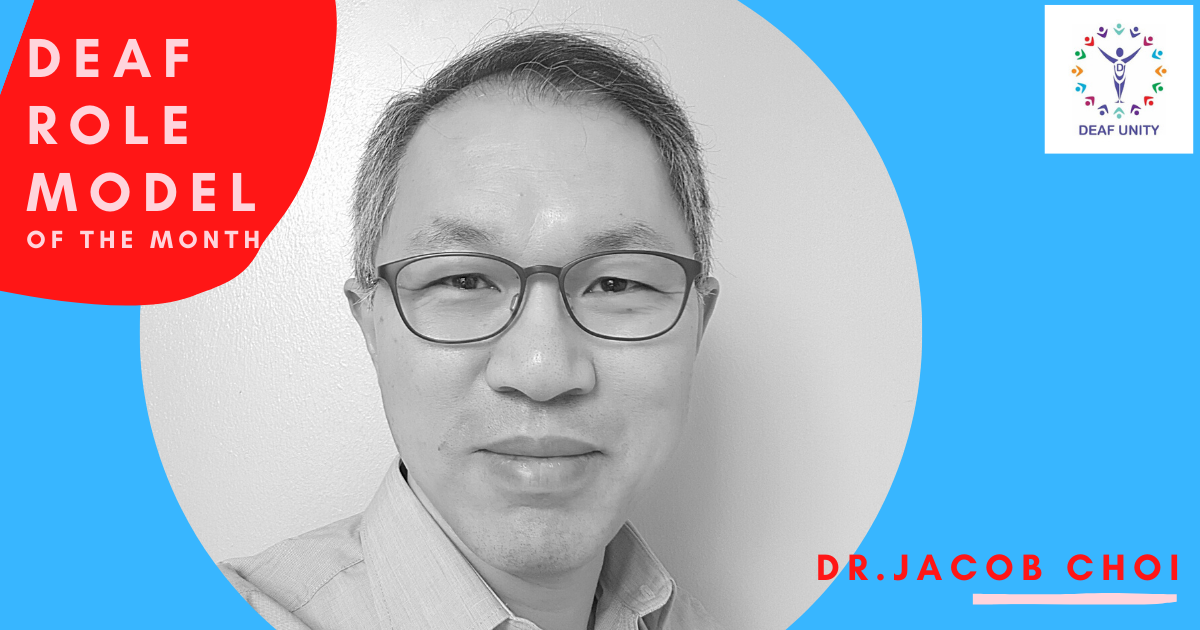
Each month we invite an inspirational or outstanding deaf role model to share their story. From what they’ve learnt, to what they wish they’d have known and their best deaf tips.
This month, meet profoundly deaf psychotherapist and philosopher Dr. Jacob Choi. Originally from South Korea, he moved to the UK at 17 where he worked hard to learn English, and went on to complete impressive studies at university.
Scroll down for the BSL translation of this interview.
1. Hi Dr. Jacob! Tell us about yourself?
I was born in South Korea but when I was 17 years old, my father became the managing director of a company based in London, so my family moved here. When my father went back to South Korea after 6 years, I was at university, so decided to stay in the UK.
Initially, I wanted to become a university lecturer but when I did a Phd in philosophy, I changed path to become a psychotherapist, and have been enjoying working with both deaf and hearing clients in London. When I work with hearing people, I use a Phonak microphone hung on their necks and lipread them.
2. How would you describe your deafness?
I was born hearing, and my family are all hearing. When I was 10 years old, I had a high fever and gradually lost my hearing. I am now profoundly deaf.
When I was younger, my parents encouraged me to speak and always took time to stop and listen to what I said. Learning English was a big challenge. I learned to lipread and how to speak and write English from private tutors, and also had speech therapy. When I was studying at university, I had to read and write a lot, which helped me improve my writing.
3. What is your experience of BSL?
Growing up I could lipread well, so I could cope with one-to-one situations, but found it difficult to be involved in group discussions. That’s why I decided to learn BSL at college, and where I also discovered the deaf community, and started to make deaf friends.
4. What was your experience of education and higher education as a deaf person?
When I was at university, there was no interpreting service for deaf students. My Phd course had one-to-one tuition for our dissertation writing, and luckily I was able to lipread my dissertation supervisor well.
I had interpreting support for my psychotherapy course because there were a lot of group discussions. Sometimes, some tutors didn’t understand why I needed interpreters, but the university was proactive in helping them understand my needs.
5. Have you faced any obstacles or challenges from being deaf? And how have you overcome these?
Learning English was very difficult. However, I kept on reading and writing which helped me to improve.
Whilst studying for my Phd in philosophy, I was invited to academic conferences but struggled to find an interpreter who could understand philosophical jargons. I had to miss some of the conferences but tried to do my own studies instead.
6. Why were you drawn to Psychotherapy?
I wanted to share philosophical wisdom with people in a practical way. The fundamental question we ask in philosophy is ‘What is the right way of life?’. Psychotherapy has borrowed a lot of ideas from philosophy, so for me, it’s an extension of my philosophical life.
7. How do you think Psychotherapy can aid those in the deaf community?
Regulating your feelings is difficult. When you can’t regulate your feelings, it affects your relationships with others and your mental health.
Each person faces different challenges in regulating their feelings, but psychotherapy can help deaf people identify their own problems, and improve their quality of life and their relationships.
8. What advice would you give to anyone struggling with their mental health and/or deafness?
Pay attention to yourself more than other things or other people. Respect your feelings and spend time learning how to deal with them.
9. What is one thing you wish you’d have known before studying or working as a deaf person?
I wish I’d have known how much interpreting helps me, and so I should have learned sign languages earlier.
10. What ways do you think hearing people can be allies to the deaf community?
I believe humility is important, so that hearing people don’t abuse their power or patronise the deaf.
11. 3 top tips for deaf people?
- Pay attention to your own self more than other people.
- Be truthful with, and respect, yourself.
- Be humble in your relationship with yourself and with others.
BSL Translation
Looking for more support? We’ve made it our mission to improve the lives of deaf people everywhere. Check out Deaf Unity’s projects to find out what we can do for you. If you’d like to get in touch, contact us here.

I met Dr Jacob Choi at St Augustine’s Church in Hammersmith! I was able to tell parishioners & visitors that he is deaf. People around me were grateful to know this & we thought that he said the Mass very well. It was a very well attended Sunday Mass then before Covid. My heart is sad that there are limited people attending now. I hope it gets better. Especially for Bishop Michael’s 50th Anniversary of the Priesthood on Sunday 26th September 2021. Deo Gratias.